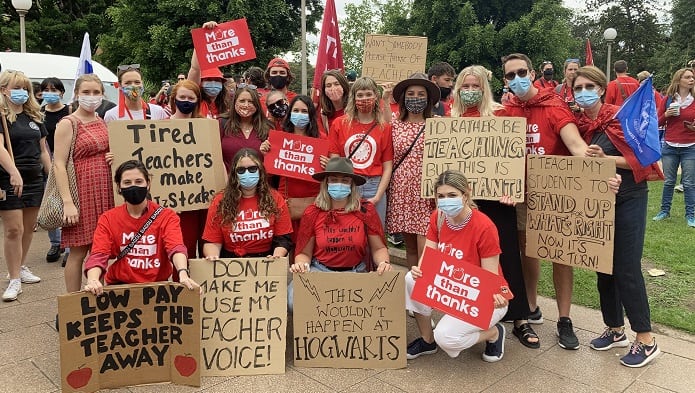Anthony Albanese’s campaign stumbles have led to fears that Scott Morrison might steal election victory, as happened in 2019. With inflation over 5 per cent, we need to hit the streets to seize the chance to drive Morrison out and build the struggle that can win real change.
Polling still shows Labor well ahead, with Newspoll’s two-party result unmoved at 53 per cent to 47 per cent.
But Albanese is not inspiring any confidence he can win. Labor’s timid small target approach generates no enthusiasm about change. Labor is simply relying on anger at Morrison’s failures to get it over the line.
The Coalition has dramatically escalated its warmongering against China after the Solomon Islands signed a security deal in the face of opposition from Australia and the US. Defence Minister Peter Dutton declared that the government must “prepare for war” because “the Chinese”, he says, “are on a very deliberate course”.
Labor has fed the militarism and nationalist hysteria, accusing the Coalition of “the worst failure of Australian foreign policy in the Pacific” since the Second World War. Morrison responded by accusing Labor of “always taking China’s side”.
In fact Labor is in lock step with the Liberals over the obscene increase in military spending aimed at confronting China, throwing its support behind the government’s plan to spend 2 per cent of GDP on defence each year and the $170 billion for nuclear subs.
But it is their combined efforts to ramp up confrontation with China that are making us less safe. Australia’s aggressive military build-up only encourages Chinese nationalism and its own preparations for war, as the US and Australian governments step up their threats.
Morrison’s efforts to engineer a khaki election are not likely to save him. But Labor’s response means that billions of dollars that could be spent on hospitals, aged care or climate action will be poured into weapons of war. And it locks in the danger of military escalation.
Shocking
Labor is embracing the bulk of the Liberals’ policies, and as a result many people can’t work out what Albanese actually stands for. His only major announcements so far have been on aged care and childcare.
Ending the shocking neglect of aged care residents would be massively popular.
But Labor’s promises are modest. While it says it would ensure registered nurses are on site 24 hours a day, improve meals and increase staff, it is pledging just $2.5 billion over four years for this.
Labor has also promised to fund whatever wage rise the Fair Work Commission orders for aged care workers. But it has refused to back union claims for a 25 per cent wage increase to end appallingly low wages of as little as $22 an hour.
Albanese would also go further than Morrison in increasing childcare subsidies.
But neither plan would end the dominance of private providers and profiteering that plagues both aged care and childcare services.
On climate change, Labor is trying to have it both ways, saying it will support renewable energy and create jobs but also backing the Coalition’s plans to expand coal and gas mining.
Labor’s small target approach has kept Morrison in the race, allowing him to argue that with Labor, you don’t know what you’re getting. But the bigger danger is that, if Labor does win, its approach guarantees a hopelessly right-wing Labor government.
Mobilise
Many people will vote 1 Greens 2 Labor to send Albanese a message that more serious change is needed from Labor.
But what we really need is to raise the level of struggle on the streets and in the workplaces. We need more strikes and demonstrations to mobilise the anger against Morrison and create greater momentum for change. If Morrison is defeated on the back of a wave of protest, it will also prepare the movements to keep up the fight that will be needed if Labor is elected.
The ACTU has refused to call major pre-election stopwork demonstrations, relying on an even more low-key electoral campaign than at the last election in 2019.
But some unions are starting to strike back. NSW nurses have taken two days of strike action since February, and teachers in NSW will strike again on 4 May, following a 24-hour stopwork in December, as pressure builds to break the state government’s pay cap.
Staff at Sydney University are holding a two-day strike on 11 and 12 May. Thousands of aged care workers in Queensland, SA and WA have also voted to strike.
The climate movement is following up its 25 March actions with an election Climate Strike on 6 May.
Everyone needs to back these protests and strikes and join the push to get rid of Morrison. But the fight won’t be over on election day.
Action on the streets before the election is also the key to ending the war-mongering and winning the change we need in funding services, climate action and the real pay rises workers need.




